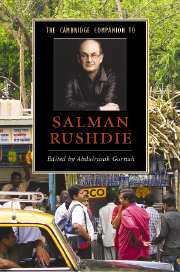1 - Introduction
Published online by Cambridge University Press: 28 November 2007
Summary
'The past is home albeit a lost home in a lost city in the mists of lost time.' Salman Rushdie wrote that in 1982, in the early period of his new fame as the author of Midnight's Children, which had won the Booker Prize in 1981. The elegiac tone is striking. Many years before the fatwa threatened to make Rushdie's exile from India a permanent one, and at a time when he was 'enjoying the unique pleasure of having written . . . a book that people liked', he laments the loss of the city his novel celebrates. Clearly the present life, London and fame, have not displaced the memory of India and Bombay as a constitution of 'home'. Rushdie here describes a sense of being absent from his most intense reality that will be familiar to his migrant readers. The 'lost city in the mists of lost time' is Bombay in the 1950s, which is the period when Rushdie grew up, and which is the period of childhood in Midnight's Children. It is to this time and this city that Rushdie locates the best of India's possibilities, a time when Nehru's vision of a tolerant and plural India seemed achievable, and in a city which in some ways appeared to have made its own way towards that vision.
Salman Rushdie was born in Bombay in 1947, the year of India's partition and independence. He was born in June, some weeks before the date of India's independence (15 August), but the family joke was that the young Salman's appearance was the true cause of the departure of the British. This linking of the birth of a child and the birth of a nation provided 'the germ of a novel, Midnight's Children'. In the meantime, he had plenty of other things to do before he got to write that novel. He attended Cathedral School in Bombay, an English Mission School, just like his narrator Saleem would do in the novel ('In my nearlyninth year I had begun to attend the Cathedral and John Connon Boys' High School'). He was at the school until 1961, when he was sent to Rugby School, a famous boarding school in England.
- Type
- Chapter
- Information
- The Cambridge Companion to Salman Rushdie , pp. 1 - 8Publisher: Cambridge University PressPrint publication year: 2007
- 1
- Cited by

